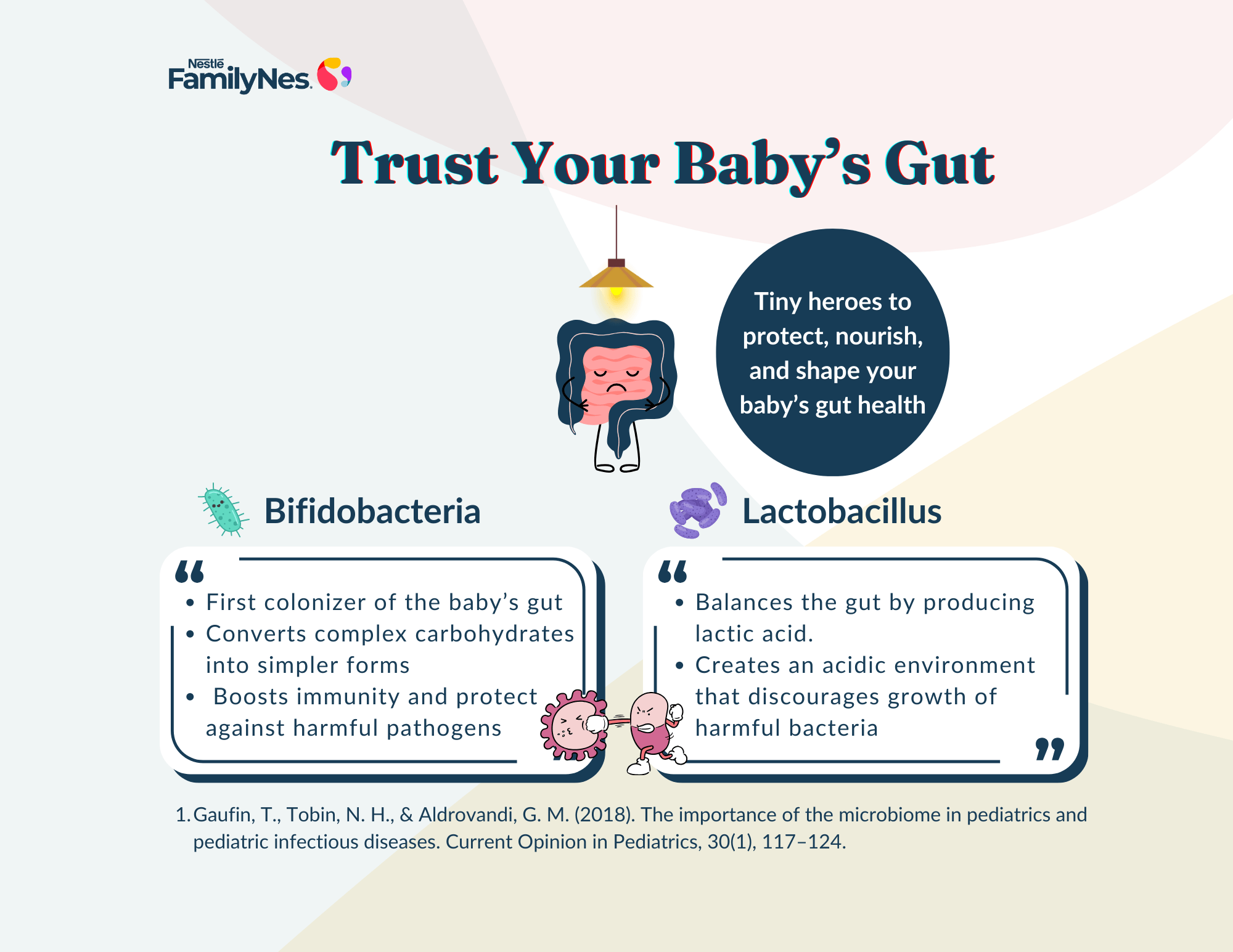
The invisible world inside your baby: Understanding the Gut Microbiome
As a mother, you want the best for your baby. Nature has designed and intended specific purposes for every part of your baby’s body. The gastrointestinal system or the gut is home to a community of microbes. These little “bugs” are there to serve many purposes. They play significant roles in optimizing and modifying growth, development, and overall healthy state of any individual. This community, known as the microbiome, is made up of trillions of bacteria, fungi, and different microorganisms.1
Let's dig a little deeper into this unseen, tiny heroic world that shapes your baby's future.
Meet the Microbiome: Your baby’s tiny community
When a baby is born, their gut starts occupying microbes right away. Initially, the gut is nearly clean, but within moments of birth, those tiny creatures from the surrounding environment begin to move in. In just a few days, your baby’s microbiome becomes special and specific. The type of microorganisms that colonise the gut, and their numbers are influenced by many factors such as how the baby was born (vaginal birth or C-section), feeding methods (breastfeeding, formula feeding, or a combination), and the micro environment.2
The Tiny Heroes: Key microbes that make a difference

Among the beneficial microbes, some are known to be beneficial to baby’s health or in other words can be called as the shining stars. These tiny warriors work behind the scenes to play a very important role in protecting, nourishing, and shaping the baby’s gut health.
The Bodyguard Effect: How your baby’s gut microbiome protects them
Did you know? 70-80% of the immune cells are located in gut.
Your baby’s microbiome acts as a natural defence system. Good bacteria work hard to fight off the harmful bacteria reducing the risk of infections.5 Additionally, the gut microbiome plays a role in training the immune system, helping to distinguish between harmful invaders and harmless substances. This can reduce allergies and autoimmune conditions later in life.
Milk, Microbes, and Magic: Feeding the Microbiome
A mom's choice to feed her baby, and the options she selects can affect their gut health. Breast milk is nature's perfect food for the baby. Apart from being the best source of macro and micronutrients that directly influence positive growth and development, mother’s own breast milk has the right molecules that help good bacteria grow. When babies breastfeed, their gut gets colonised with helpful bacteria, like Bifidobacteria. This is great for digestion and guides the baby's immune system development to follow the correct track. Human milk is packed with prebiotics and probiotics. All of these factors work together to keep your baby's gut healthy.
Microbiome Makeover: How to Support Your Baby’s Gut Health
Here are some practical ways to nurture your baby’s gut microbiome:
- Prioritize breastfeeding: Utmost efforts should be made to breastfeed your baby soon after birth and thereafter exclusively till 6 months of age. This is undoubtedly the best choice as it contains almost everything the baby needs. Probiotics and prebiotics in the right amounts support your baby’s gut health.
Unavailability of breastfeeding: In case breastfeeding is not possible or if an infant formula is prescribed by a medical practitioner (this may happen in some specific medical/ social circumstances), choose an alternative that is scientifically adapted to support gut health. Talk to your pediatrician to know the infant food alternatives containing probiotics or prebiotics.
While most microbiome changes occur naturally, ensuring the balance of good or bad bacteria is critical to maintain gut health. Be mindful of signs that may indicate such imbalances such as persistent diarrhea, excessive fussiness, or digestive issues. If you notice these symptoms, consult your pediatrician.
Want to learn more about baby nutrition and gut health? Subscribe to our blog for more insights and expert tips!
References
- Mueller NT, Bakacs E, Combellick J, Grigoryan Z, Dominguez-Bello MG. The infant microbiome development: mom matters. Trends Mol Med. 2015 Feb;21(2):109–17.
- Dominguez-Bello MG, Costello EK, Contreras M, Magris M, Hidalgo G, Fierer N, et al. Delivery mode shapes the acquisition and structure of the initial microbiota across multiple body habitats in newborns. Proceedings of the National Academy of Sciences. 2010 Jun 29;107(26):11971–5.
- Current Opinion in Pediatrics [Internet]. [cited 2025 Jan 21]. Available from: https://journals.lww.com/co-pediatrics/abstract/2018/02000/the_importance_of_the_microbiome_in_pediatrics_and.18.aspx
- Choden T, Cohen NA. The gut microbiome and the immune system. Explor Med. 2022 May 31;3(3):219–33.
- The Human Microbiome and Child Growth – First 1000 Days and Beyond: Trends in Microbiology [Internet]. [cited 2025 Jan 21]. Available from: https://www.cell.com/trends/microbiology/fulltext/S0966-842X(18)30204-X?_returnURL=https%3A%2F%2Flinkinghub.elsevier.com%2Fretrieve%2Fpii%2FS0966842X1830204X%3Fshowall%3Dtrue
- Frontiers | Understanding the Role of the Gut Microbiome in Brain Development and Its Association With Neurodevelopmental Psychiatric Disorders [Internet]. [cited 2025 Jan 21]. Available from: https://www.frontiersin.org/journals/cell-and-developmental-biology/articles/10.3389/fcell.2022.880544/full
- Appleton J. The Gut-Brain Axis: Influence of Microbiota on Mood and Mental Health. Integr Med (Encinitas). 2018 Aug;17(4):28–32.
- Catassi G, Aloi M, Giorgio V, Gasbarrini A, Cammarota G, Ianiro G. The Role of Diet and Nutritional Interventions for the Infant Gut Microbiome. Nutrients. 2024 Jan;16(3):400.


